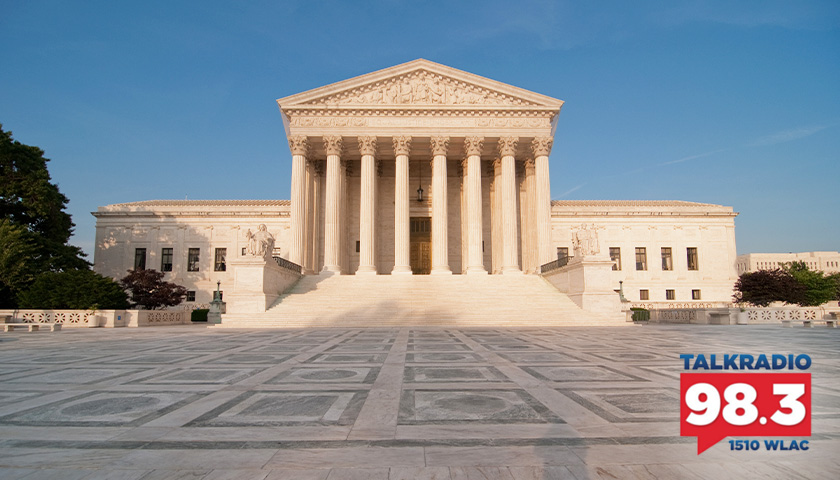Live from Music Row, Monday morning on The Tennessee Star Report with Michael Patrick Leahy – broadcast on Nashville’s Talk Radio 98.3 and 1510 WLAC weekdays from 5:00 a.m. to 8:00 a.m. – host Leahy welcomed the original all-star panelist Crom Carmichael in studio to discuss Professor Phillip Hamburger’s recent article at The Wall Street Journal referencing the US Supreme Court and the use of regulatory power.
Leahy: In studio, the original all-star panelist Crom Carmichael. Crom, just to continue our discussion, there’s a phrase that comes to mind when I look at these little small procedural changes that they had this big public battle over for a week in Washington, D.C. making the Republicans look weak and lacking in unity.
And the Democrats looking at this sort of laughing all the way to the electoral ballot. But the phrase that comes to mind is, “lipstick on a pig.”
Carmichael: Yes. They’re all kinds of niceties, and they will improve things a bit, but not one of them can’t simply be changed when the Democrats take over, and it just doesn’t do a lot. But, Michael, I read an article in The Wall Street Journal. And when I read it, I said, hot diggity dog. Because it’s written
Leahy: Hot diggity dog. You were very excited by this article.
Carmichael: Because it’s written by Philip Hamburger. (Laughs)
Leahy: You got me on that one.
Carmichael: I thought I’d stick that in Philip.
Leahy: Philip Hamburger. Ready for this?
Carmichael: I want to get to the meat of the matter.
Leahy: Philip Hamburger is a rare intellect.
Carmichael: That’s good.
Leahy: We’ve had him on the show.
Carmichael: You have?
Leahy: We’ve had him on the show. You’ve been here. He’s a professor of law at Columbia. And he is a leading critic.
Carmichael: We like him a lot.
Leahy: He’s a leading critic of the deep state and of the runaway administrative state.
Carmichael: Yes. This article is headlined: How the Supreme Court Set the Stage for the January 6 Riot. And I would say that you could also expand that to say many other terrible things.
But let me just read a few things from here. In the 20th century, the Supreme Court simultaneously expanded Congress’s legislative powers and allowed them to be exercised by administrative agencies, the High Court thereby loosed administrative agencies to exercise immense legislative power. Little could be more destabilizing. I just think that’s an absolute truism. Let me continue on.
Leahy: Those two sentences describe the governmental problem we’ve had for the past century.
Carmichael: The changes that Republicans push need to address these problems. And that’s why I say that these other things are niceties, but they won’t do much. I’m continuing on here.
For a long time, the implications of this were muted because neither Congress nor the agencies took full advantage of what they might get away with under the Court’s doctrines.
But in recent decades, the federal government has relied on the Court’s expansive vision of its legislative power to regulate education, speech, healthcare, insurance, sexual relations, and other areas that once seemed largely out beyond Washington’s reach.
Federal agencies have become the regulatory vanguard, audaciously exploiting congressional ambiguity and silence to bring the breadth of federal power to bear on Americans. And so then it goes on to explain that in more detail and improve on explaining and buttressing the argument. And Philip Hamburger is exactly right here.
Not only does it create a level of frustration among the citizenry that brings about an example of something like January 6th, but it also creates the frustration that you saw where you have 20 members of the Republican Party who are very, very frustrated with the status quo.
And so they’re doing all they know how to do to try to use this brief moment to try to get some deals passed that will make things better. But they’re missing the main point, is what I’m saying because here’s what happens.
Government employee unions now at the federal, state, and local levels, collect over $9 billion a year, a year, in dues. That comes straight out of the government employees’ paychecks. Employees never get it. It goes to the unions and it is used to expand the size and the power of government.
Is it used to improve the lot of individual members of the union? The answer is no, because the government employee unions are more interested in adding to the number of union members than they are in improving the lot of the individual members that they currently represent.
For example, in teachers. We now have more non-teachers in government-run schools and the bureaucracy that oversees them than teachers. That affects the teacher’s pay.
Leahy: I have two words for Professor Hamburger for that article.
Carmichael: What?
Leahy: Well done. (Laughter)
Listen to today’s show highlights, including this interview:
– – –
Tune in weekdays from 5:00 – 8:00 a.m. to The Tennessee Star Report with Michael Patrick Leahy on Talk Radio 98.3 FM WLAC 1510. Listen online at iHeart Radio.
Photo “Supreme Court” by Mark Fischer. CC BY-SA 2.0.





